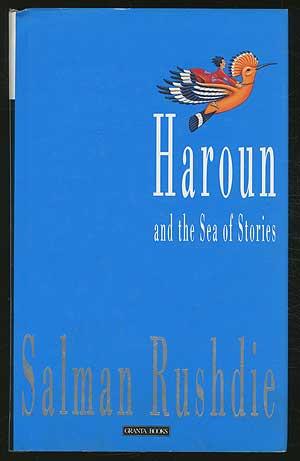

In the course of the story he is aided by supernatural companions and confronts and defeats a wicked magician. It follows the classic folk tale in which the hero travels to strange lands to lift a spell on his nativeĬountry or cure his father of a fatal ailment. On the surface, "Haroun and the Sea of Stories" is a lively, wonderfully inventive comic tale with an updated Arabian Nights background. Who could have believed that a world-famous spiritual leader would publicly exhort his millions of followers to murder a novelist in another country, and promise them eternal salvation should they succeed?' The only difference is that the experiences that lie behind "Haroun and the Sea of Stories" are nearly as fantastic as anything in the tale. Salman Rushdie's remarkable new children's book belongs in this company. White, who both as child and adult was described as resembling a mouse, made the hero of "Stuart Little" Never attains maturity, and must borrow or steal other people's children for his playmates. Many of Beatrix Potter's animals escape from claustrophobic domestic environments like that of her own respectably repressive Victorian parents. NovemAnother Dangerous Story From Salman Rushdie By ALISON LURIEĮhind many of the greatest and most joyful children's fantasies move the shadows of real and often unhappy events in theirĪuthors' lives.

He currently lives in New York City.Another Dangerous Story From Salman Rushdie Rushdie has been married four times and has two sons.

Haroun and the Sea of Stories was written so that Rushdie could explain the situation to his first son, born in 1979. The fatwa persists to this day in some regards, as Iran neither actively supports nor discourages individuals from attempting to murder Rushdie. British police placed Rushdie and his family under police protection for several years. The book was banned in 13 countries, and the following year, the spiritual leader of Iran issued a fatwa calling for Rushdie's execution. His fourth novel, The Satanic Verses (1988), created a major scandal, as many Muslims worldwide took offense to Rushdie's irreverent portrayal of Muhammad. His first novel, Grimus (1975), was mostly ignored, but his second novel, Midnight's Children (1981) won the 1981 Booker Prize and was awarded several other prizes over the next 30 years. He worked briefly in Pakistan as a television writer before moving to England to work as a copywriter. Rushdie was born in Bombay, India, to a Muslim family of Kashmiri descent.


 0 kommentar(er)
0 kommentar(er)
